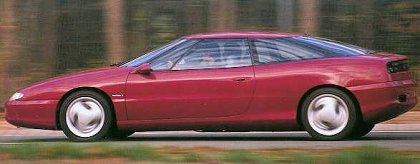1990 Citroën Activa II
- Dec 5, 2021
- 1 min read
The Activa ll, a more production-like sedan with seating for four, was presented at the 1990 Paris Auto Show. The hydractive suspension fitted to the car modified the vehicle's altitude according to speed. The headlights, vehicle height, and other functions were changed to certain speeds to suit the driver's needs. The car raised slightly for easier entry and exit when the doors were opened. The antiroll suspension kept the car flat while negotiating severe turns by monitoring speed and steering angles. The heads-up display system, also used on the original Activa concept, projected the driver's vital information on the windshield. An interior computer presented the driver with twenty-four safety functions and warned the driver if anything needed attention. Rather than a transmission shift lever, buttons for each gear were mounted on the console. The computer also served as a talking navigational system.
This stunning two-door coupé is based largely on XM mechanical bits fitted with a 3 liter V6 24 valve engine developing 200 bhp, an automatic 4-speed gearbox, an active antiroll system, and a multi-function VDU.
Activa II could have been put into production. Much of the suspension technology would find its way into the Xantia Activa. Still, Citroën felt that it would not have been commercially viable since to make a profit, it would have been competing with marques with a proven track record in building high-performance coupés. They considered it unlikely that Porsche, BMW, and Mercedes owners would be seduced by the double chevron. The fact that wealthy Citroën enthusiasts would have snapped it up did not sway PSA's management.
Source: Concept Car Central; www.citroenet.org.uk

%20(4)_edited.png)






























































Comments